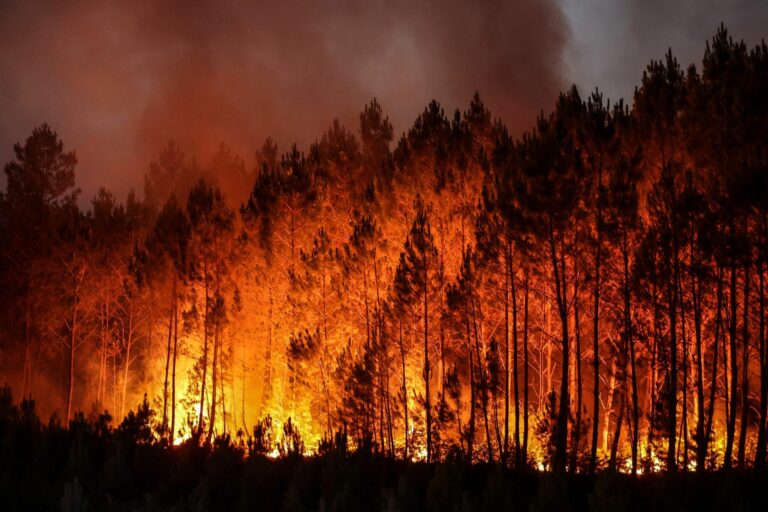As wildfires increasingly threaten communities across Atlantic Canada, residents face growing concerns not only about safety but also about financial protection. Understanding the intricacies of insurance coverage amid these emergencies has become essential for homeowners and businesses alike. This article explores the critical insurance information Atlantic Canadians need to navigate the challenges posed by wildfires, offering expert insights and practical guidance to help mitigate risks and secure adequate coverage in a region where fire incidents are on the rise.
Wildfire Risks Escalate in Atlantic Canada as Climate Changes Impact Local Communities
Residents in Atlantic Canada are feeling the growing pressure as wildfire seasons lengthen and intensify, driven by shifting climate patterns. Increased temperatures, prolonged dry spells, and changing precipitation levels have created conditions ripe for wildfires to ignite and spread more rapidly than ever before. Communities now face a heightened risk, with provincial authorities ramping up wildfire preparedness measures, including public alerts, evacuation plans, and infrastructure reinforcement. Local governments are also calling on homeowners to review and update their insurance policies, emphasizing the critical importance of adequate coverage to mitigate potential financial losses caused by these natural disasters.
Key insurance considerations for Atlantic Canada residents include:
- Verification of wildfire coverage specifics within existing home or property insurance policies
- Understanding potential exclusions, deductibles, and claim processes related to wildfire damage
- Exploring options for additional protection such as wildfire endorsement riders
- Preparing documentation and inventories of personal belongings to expedite claim settlements
| Insurance Aspect | Resident Action | Benefit |
|---|---|---|
| Coverage verification | Review policy details | Ensures protection aligns with current wildfire risks |
| Additional riders | Consult with agent | Enhances financial safeguards beyond standard policies |
| Documentation | Inventory possessions | Speeds up claim approval and payout |
Understanding Insurance Coverage for Wildfire Damage in Atlantic Canada
Homeowners and renters in Atlantic Canada should be aware that standard insurance policies typically cover damage caused by wildfires, but coverage details can vary significantly. Most policies include protection against fire-related destruction to the physical structure, personal belongings, and additional living expenses if temporary relocation is necessary. However, it’s crucial to carefully review your policy’s fine print regarding exclusions, limits, and deductible amounts. For instance, some policies might not cover smoke damage or loss due to evacuation unless explicitly stated. Consulting with your insurance provider ahead of wildfire season is essential to ensure you have adequate protection tailored to your property’s risks.
Key points to verify in your wildfire insurance coverage include:
- Extent of fire and smoke damage coverage for both dwelling and contents
- Coverage for landscaping, fences, and other external structures
- Details of temporary housing or living expenses after damage
- Evacuation costs and loss of use provisions
- Any exclusions related to natural disasters or delays in damage assessment
| Insurance Aspect | Typical Coverage | Potential Limitations |
|---|---|---|
| Dwelling Fire Damage | Usually covered | May exclude wildfire caused by negligence |
| Personal Belongings | Covered up to a set limit | High-value items may require riders |
| Additional Living Expenses | Included for temporary relocation | Time limits often apply |
| Smoke Damage | Sometimes covered | Check specific policy wording |
Essential Steps for Residents to Protect Property and Ensure Claims Are Processed Efficiently
Residents affected by wildfires can take critical measures to safeguard their property and streamline the insurance claims process. Prioritize safety first: evacuate promptly and secure your home if time allows. Documenting your property before and after the wildfire is essential-use photos or videos to capture the current condition. Keep an inventory of valuables and important documents in a safe, accessible place. It’s also advised to maintain direct contact with your insurance provider and keep a record of all correspondence to avoid any miscommunication during stressful times.
When filing a claim, efficiency and accuracy can significantly impact the outcome. Residents should:
- Submit detailed and honest reports of damage, including all supporting documentation.
- Retain receipts for emergency repairs or temporary housing costs, as many policies may reimburse these expenses.
- Request a clear explanation of your coverage scope and any deductibles you might face.
- Be aware of common claim pitfalls, such as incomplete documentation or failure to meet claim deadlines.
| Step | Action | Benefit |
|---|---|---|
| 1 | Document property condition | Strong evidence to support claims |
| 2 | Keep receipts for emergency expenses | Maximize reimbursable costs |
| 3 | To Wrap It Up
As wildfires continue to pose significant risks to communities across Atlantic Canada, residents are urged to stay informed about their insurance coverage and take proactive steps to safeguard their properties. Understanding policy details, including coverage limits and exclusions related to wildfire damage, can make a critical difference in recovery efforts. As the fire season evolves, maintaining open communication with insurers and local authorities remains essential. Staying prepared today can help Atlantic Canadians protect their homes and livelihoods against the growing threat of wildfires. |




